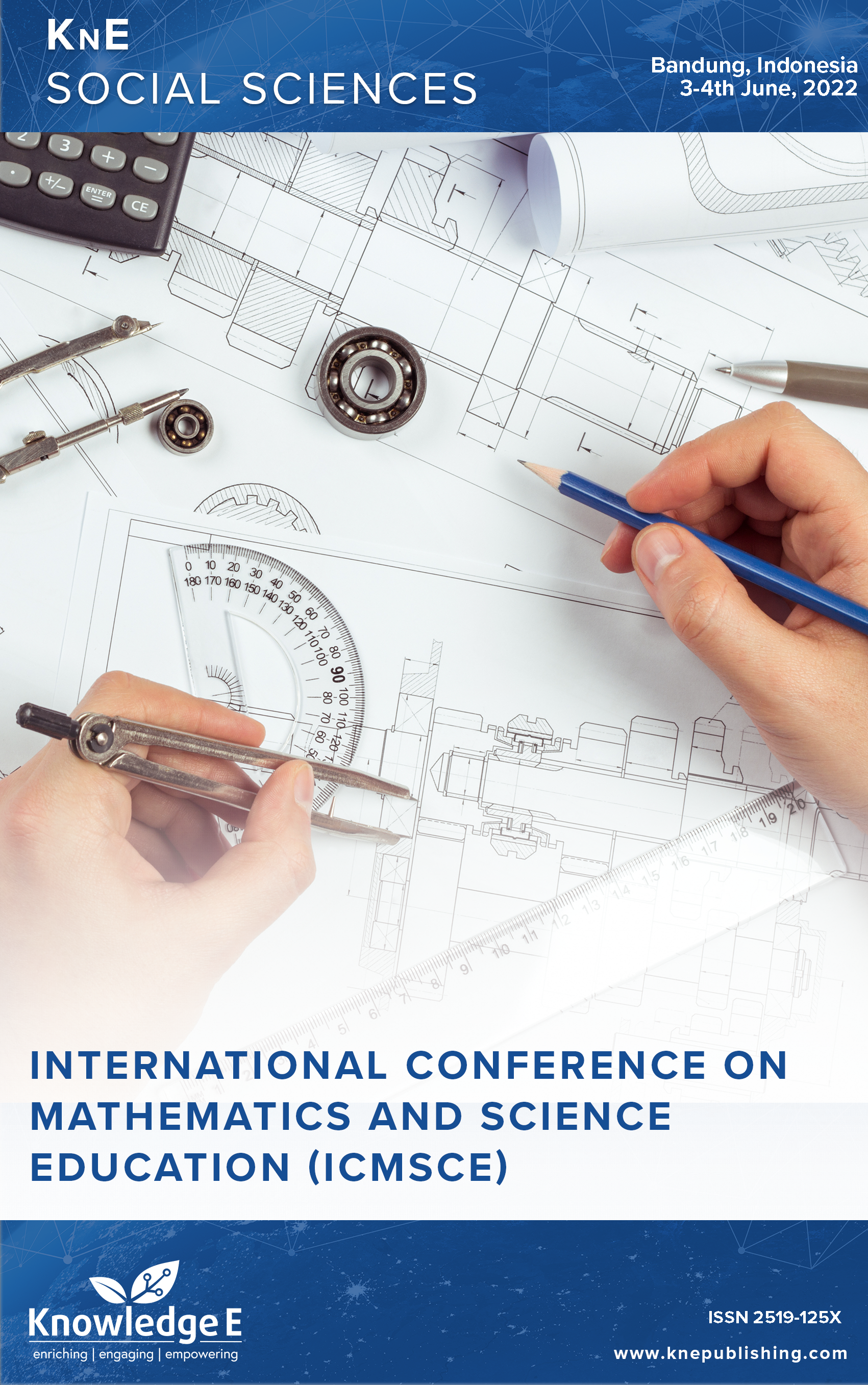Mathematical Reasoning Ability and Mathematics Self-efficacy in Gender Differences
DOI:
https://doi.org/10.18502/kss.v9i13.15964Abstract
Gender differences and aspects of self-efficacy are factors influencing the success of the mathematics learning process. This study aims to obtain an explanation of mathematical reasoning abilities based on gender differences in terms of mathematical self-efficacy. The sample of this research is a collection of scores of mathematical reasoning abilities, gender differences, and mathematical self-efficacy scores of XIth grade students from a high school in Bandung. The research sample consisted of 35 students, consisting of 19 male and 16 female students. The research instruments were tests of mathematical reasoning abilities (MRA), gender differences, and a mathematics self-efficacy (SEM) questionnaire. Data analysis was done using ANACOVA, with MRA in the form of interval scale, gender category scale, and SEM as covariate with interval scale. The results of the study were as follows: (1) there is a linear relationship between mathematical self-efficacy and mathematical reasoning ability; (2) there is no difference in students’ mathematical reasoning abilities based on gender differences. Furthermore, SEM students and gender differences have an influence on the MRA achieved by students.
Keywords: gender differences, mathematical reasoning ability, mathematics self-efficacy
References
Jablansky S, Alexander PA, Dumas D, Compton V. Developmental differences in relational reasoning among primary and secondary school students. J Educ Psychol. 2016;108(4):592–608. DOI: https://doi.org/10.1037/edu0000070
Kadarisma G. “Improving students’ logical thinking mathematic skill through learning cycle 5e and discovery learning,” Proceeding of 3rd International Conference on Research, Implementation and Education of Mathematics and Science. no. May, p. 351, 2016.
Sari YM, Kartowagiran B, Retnawati H, Fiangga S. “The characteristics of mathematical reasoning and proof test on indonesian high school students.” Journal of Physics: Conference Series. vol. 1200, no. 1, p. 2019. https://doi.org/10.1088/1742- 6596/1200/1/012007. DOI: https://doi.org/10.1088/1742-6596/1200/1/012007
Kaushal R, Rose SC, Sehrawat S, Sharma R, Lata P, Gorakhnath I. Exploration of the factors of mathematics anxiety and its impact on the achievement of students in mathematics. Int J Health Sci (Qassim). 2022;:1236–47. DOI: https://doi.org/10.53730/ijhs.v6nS9.12482
Kaufmann OT, Stenseth B. Programming in mathematics education. Int J Math Educ Sci Technol. 2021;52(7):1029–48. DOI: https://doi.org/10.1080/0020739X.2020.1736349
Kurnaz A. Examining Effects of Mathematical Problem-Solving, Mathematical Reasoning and Spatial Abilities on Gifted Students’ Mathematics Achievement. World Scientific Research. 2018;5(1):37–43. DOI: https://doi.org/10.20448/journal.510.2018.51.37.43
Kilpatrick J. Helping children learn mathematics. 2010.
Kristanto YD, Putu D, Putra W. “Students’ mathematical reasoning.” pp. 383–392.
Erdem E. “An investigation of the seventh-grade students’ mathematical and probabilistic reasoning skills (MA Thesis).” no. December 2011, p. 2011.
Allen CE, Froustet ME, LeBlanc JF, Payne JN, Priest A, Reed JF, et al. National council of teachers of mathematics. Arith Teach. 2020;29(5):59. DOI: https://doi.org/10.5951/AT.29.5.0059
Cheung ACK, Shek DTL, Hui ANN, Leung KH, Cheung RSH. “Professional development for teachers of gifted education in Hong Kong: instrument validation and training effectiveness.,” International Journal of Environmental Research and Public Health. vol. 19, no. 15, p. 2022. https://doi.org/10.3390/ijerph19159433. DOI: https://doi.org/10.3390/ijerph19159433
Kadarisma G, Nurjaman A, Sari IP, Amelia R. “Gender and mathematical reasoning ability.” Journal of Physics: Conference Series. vol. 1157, no. 4, p. 2019. https://doi.org/10.1088/1742-6596/1157/4/042109. DOI: https://doi.org/10.1088/1742-6596/1157/4/042109
Zhu Z. Gender differences in mathematical problem solving patterns: A review of literature. Int Educ J. 2007;8(2):187–203.
Arhin AK, Koryoe Offoe A. Gender differences and mathematics achievement of senior high school students: a case of Ghana National College. J Educ Pract. 2015;6(33):67–74.
Marzuki, E.C.M. Asih, and Wahyudin, “Creative thinking ability based on learning styles reviewed from mathematical communication skills.,” Journal of Physics: Conference Series. vol. 1315, no. 1, p. 2019. DOI: https://doi.org/10.1088/1742-6596/1315/1/012066
Wolbers T, Hegarty M. What determines our navigational abilities? Trends Cogn Sci. 2010 Mar;14(3):138–46. DOI: https://doi.org/10.1016/j.tics.2010.01.001
Ruggiero G, Sergi I, Iachini T. Gender differences in remembering and inferring spatial distances. Memory. 2008 Nov;16(8):821–35. DOI: https://doi.org/10.1080/09658210802307695
Carr M, Alexeev N. Fluency, accuracy, and gender predict developmental trajectories of arithmetic strategies. J Educ Psychol. 2011;103(3):617–31. DOI: https://doi.org/10.1037/a0023864
Schoenfeld AH. Learning to think mathematically: problem solving, metacognition, and sense making in mathematics (reprint). J Educ. 2016;196(2):1–38. DOI: https://doi.org/10.1177/002205741619600202
H.R.P. Negara, E. Nurlaelah, Wahyudin, T. Herman, and M. Tamur, “Mathematics self efficacy and mathematics performance in online learning.,” Journal of Physics: Conference Series. vol. 1882, no. 1, p. 2021. DOI: https://doi.org/10.1088/1742-6596/1882/1/012050
Karunika AM, Kusmayadi TA, Fitrana L. “Profile of mathematical reasoning ability of female students based on self-efficacy.,” Journal of Physics: Conference Series. vol. 1265, no. 1, p. 2019. https://doi.org/10.1088/1742-6596/1265/1/012008. DOI: https://doi.org/10.1088/1742-6596/1265/1/012008
Ahmad A, Safaria T. Effects of self-efficacy on students’ academic perfomance. Health and Community Psychology. 2013;2(1):2088–3129.
Masitoh LF, Fitriyani H. Improving students’ mathematics self-efficacy through problem based learning [MJML]. Malikussaleh Journal of Mathematics Learning. 2018;1(1):26. DOI: https://doi.org/10.29103/mjml.v1i1.679
Alam S, Budiarto MT, Siswono TY. Assessing students’ self-efficacy when solve mathematical problem based on gender. International Journal of Trends in Mathematics Education Research. 2022;5(4):374–86. DOI: https://doi.org/10.33122/ijtmer.v5i4.149
Marzuki, E. Cahya, and Wahyudin, “Relationship between mathematical creative thinking ability and student’s achievement in gender perspective,.” Journal of Physics: Conference Series. vol. 1521, no. 3, p. 2020. DOI: https://doi.org/10.1088/1742-6596/1521/3/032039
Hübner N, Wagner W, Hochweber J, Neumann M, Nagengast B. Comparing apples and oranges: curricular intensification reforms can change the meaning of students’ grades! J Educ Psychol. 2020;112(1):204–20. DOI: https://doi.org/10.1037/edu0000351
Lauer JE, Lourenco SF. Spatial Processing in Infancy Predicts Both Spatial and Mathematical Aptitude in Childhood. Psychol Sci. 2016 Oct;27(10):1291–8. DOI: https://doi.org/10.1177/0956797616655977
Santosa FH, Bahri S, Negara HR, Ahmad A. Kemampuan pemahaman konsep berdasarkan self-efficacy matematis dan gender dalam situasi problem-based learning. Journal of Didactic Mathematics. 2022;3(3):120–9. DOI: https://doi.org/10.34007/jdm.v3i3.1620
Zeldin AL, Britner SL, Pajares F. A comparative study of the self-efficacy beliefs of successful men and women in mathematics, science, and technology careers. J Res Sci Teach. 2008;45(9):1036–58. DOI: https://doi.org/10.1002/tea.20195

